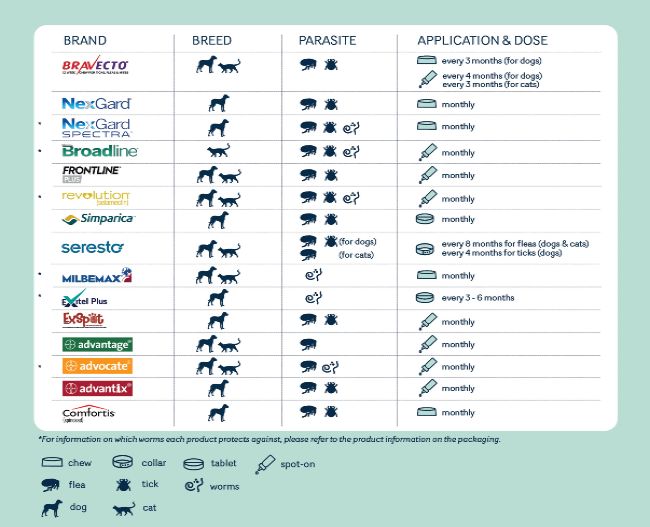One of the essential aspects of pet health care is regular tick, flea and deworming treatment. Treatment should be given all year round, not just when symptoms appear, as the consequences of bites or infestation can be serious. Here we look at the reasons why regular tick, flea and deworming treatment is vital and guide you on the treatment options available.
Why is regular tick & flea treatment so important?
Flea bites can lead to:
- Allergy Dermatitis: just one flea bite can cause flea allergy dermatitis which results in a very itchy pet. This can lead to the breakdown of the skin barrier and secondary infections.
- Tapeworm: fleas can carry tapeworm eggs and if your pet has fleas and tries to bite the itchy area where the fleas are, they can end up swallowing the flea and then get worms.
- Depending on how sensitive your pet is, one flea bite can itch for minutes or, if your pet has a flea allergy, they will itch for days. Scratching can result in secondary infections which can also cause months of discomfort for your pet.
Tick bites can lead to:
Ticks can transmit blood borne parasites and these cause conditions which are sometimes fatal, including:
- Babesiosis (otherwise known as tick bite fever): this can affect both cats and dogs. It breaks down the red blood cells and can be fatal.
- Ehrlichiosis (canine pancytopenia): this affects dogs. It causes problems with all blood cells and can be fatal.
- Mycoplasma (feline infectious anaemia): this affects cats. It causes the destruction of red blood cells and causes fever and a severe lack of appetite.
How to prevent tick and flea bites
The good news is that prevention of tick and flea bites is easy with ongoing treatment, all year round. Although spring is often the time when ticks and fleas are most prevalent, the crucial thing is that treatment is maintained 365 days a year.
Why is regular deworming important?
Pets can pick up worms easily, mainly via ingesting them as they sniff and taste things on their outdoor adventures. Puppies can also pick up worms from their mother’s milk.
Worms attach to the intestine and suck blood, leaching nutrients from your pet. In severe cases, a pet can become anaemic, there can be intestinal blockages or irritation.
Worms can also easily pass to each member of the family (from humans to pets and vice versa) so remember to deworm the entire family (although with human / pet appropriate treatment, of course).
How to keep track of your treatment plan:
The key to regular tick, flea and deworming treatment is to keep track of when it’s required. We have made it super easy for you to do so with our Routine Care Guide. Download this guide, print it out and stick it on the fridge. You can also pop into your local Absolute Pets store and pick up a copy.
Tick, flea and deworming products available:
At Absolute Pets, we have a great range of tick and flea plus deworming treatments.
The table below is a quick guide to the products available:
When choosing the right tick and flea or deworming treatment for your pets, remember the following:
- Not all tick and flea products tackle worms too.
- For each product, make sure the dosage you give to your pet is as per the dosage instructions on the packaging (usually according to your pet’s weight).
- For puppies and kittens, check from what age the treatment can be given. It may be different for different products.
Different treatments must be given at different intervals – some may be monthly; some may be every 3 months or even 4 months or 6 months.

Get in touch
A huge thank you to Dr Candice Cooper, our Absolute Pets' Vet for sharing her expertise with us and helping us put together this article.
And remember, we are also here to help so visit your local Absolute Pets store or get in touch with us online, or on Facebook.
Happy & Healthy
Absolute Pets